I really wish folks would get the whole story before they go running around spreading inaccurate information. People are just so eager to create a villian or miscarriage of justice or something to make them feel better — Larry White, Executive Director*
An anonymous source reached out to me the morning of July 15, stating that they’d received word about a library system in the state of Oklahoma planning to implement a staff policy that would restrict what library staff could say about abortion. Hours later, a now-deleted post on Reddit’s r/libraries subreddit from someone presumably within the system asked what could be done to help library workers, which led to conversations across social media. This came on the heels of the overturning of Roe and the trigger law in the state.
What transpired over the next few days is a mess of misinformation, resulting in a need by those working in the Metropolitan Library System for answers from administration, and an attempt to not only do damage control once the story leaked to Reddit but also question whether or not the library had to respond to a Freedom of Information Act request for information.
Guest: “I heard that Roe vs. Wade was recently overturned and now abortions aren’t legal in Oklahoma under most circumstances. Where can Oklahoma residents go to get an abortion?”
Staff: “I’m sorry, but at this point, I’m no longer able to assist due to current state laws. You’ll have to pursue your search from here. I can get you an internet-only card if you’d like to use one of our computers.” — “Sample Dialogues” script from Regional Director Mark Schuster, later edited as follows:
Guest: “Can you give me the number of the Planned Parenthood in Santa Fe, NM? I heard I can get an abortion there.”
Because it is out of state, we can give a phone number / address as it is a public fact, but we should not provide much more information than that. We just can’t provide information on services and treatments within Oklahoma.
Staff: “I can give you the phone number, but I can’t provide any other information on the medical treatment due to the limitations imposed by current state laws. Please feel free to pursue your information research using on our computers and information resources. If you do not have a library card, we can get you an internet-only card if you’d like to use one of our computers.”
An internal email on July 6 from Anne Hill, Engagement Manager of the Edmond Library, in the Metro Library System–which covers both the city and county of Oklahoma City, Oklahoma–asks for input on how to handle the new Supreme Court decision in light of information privacy. This, a standard practice for library workers, ensures that people who seek information will be able to freely access it; some information privacy practices in public libraries emerged following the Patriot Act, which is why, for example, records of materials checked out by individuals are not saved and why it is shared computers are wiped of their histories between sessions. For librarians who do reference work, information privacy allows them to direct users to information without fear of retribution or worry about a breach of confidentiality for either party.
Library workers provide accurate information across many topics, though they are not permitted to give medical or legal advice. For example, a library worker cannot tell a patron whether or not they have the legal right to rent out their home; they can (and should) direct them to materials on the topic, including information to local, state, and federal offices that do give guidance on such topics. Librarians cannot advise whether or not an individual should pursue a particular course of treatment for an ailment but can offer them a wide range of resources to do research on treatment options, including numbers to physician offices, patient advocate services, counselors, and other professionals who can assist in that kind of decision making.
Hill, in her email, asked three thoughtful and ethical questions: Is there any way that use of public computers can be traced back to a customer with our current system?; If we provide information to a guest about abortion, are we in violation of any law? I could imagine having such a question at a reference desk that would require searching via the Internet that would be traceable to our login. Are we allowed by law to answer such questions?; and, If we provide information on how guests can safely and anonymously find information on abortion on our public computers, does that put us at risk as a system or an individual?
Within a few hours, another Engagement Manager responded, saying they were excellent questions.
“My understanding of the “trigger law” is that aiding and abetting with the intent to procure an abortion for someone is illegal. But, we as information professionals provide information all the time! As professionals, we have no “intentions” or any control whatsoever with what people chose to do with the information provided. It’s the same logic as to why we have copies of the Anarchist Cookbook,” said the response, asking if she was on the right track.
The next day, July 7, Hill’s email was forwarded to the public manager team.
What we cannot do:
We cannot offer opinions surrounding any aspect of the topic, information about to get an abortion, or medical/legal advice.
Even information about where the procedure is “legal” vs. “illegal” could be
construed as legal advice and should be avoided.
As mentioned above, once a person indicates they will use the information to obtain an abortion, we need to immediately redirect the conversation and allow them to do their own search.
The following week, public service managers met to discuss what Roe’s overturning meant for the library. The meeting, held Thursday, July 14, included a long discussion of what the library could and could not do with the new law. Below is a screen shot shared on Reddit by the initial poster of the meeting minutes and the discussion. The name crossed out is Mark Schuster, one of the library’s regional directors.
A robust conversation about the implications of the new abortion laws on library service continued via email among several upper-level managers within the system. Notes from the meeting by Schuster were sent to Tim Spindle, Manager of Central Information Services for the library system.
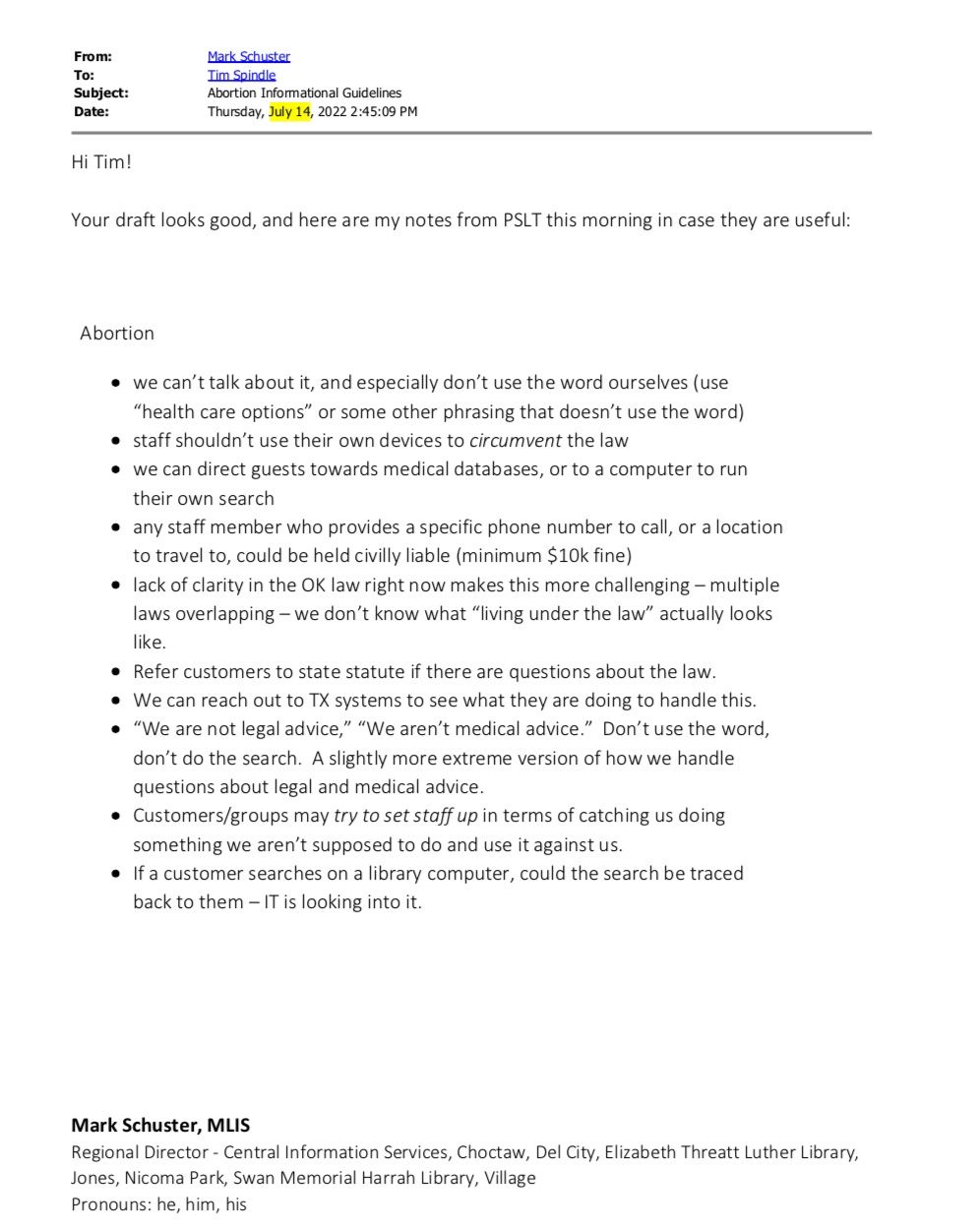
Schuster’s notes from the meeting show a discussion of what could and could not be shared with patrons. Among the highlights, a gag order on the word “abortion,” with the use of “health care options” instead and discussion of what could or could not happen to a patron who may look up information about abortion services themselves.
The notes came in response to a draft from Spindle, presumably to be sent to library information staff, about what could and could not be discussed. More specifically, Spindle sent an email to Schuster, reading that “per advice from our legal counsel, we cannot provide information to a customer that could lead to facilitating an abortion. As was explained to us (with the acknowledgement that this is still a murky area with more questions than answers at this time), if staff provide this info to a customer, we could be held personally (i.e. civilly) liable. Additionally, since this guidance has been provided to us at work by our employer, if we are found to have provided info on the clock that leads to an abortion, we could be terminated. I imagine you’ll have lots of questions about this & I do, too. We will certainly discuss this more soon, but I wanted to send you this updated guidance ASAP. Please send any & all questions you have to me & I will work to ensure they’re at least heard up the chain, if not also actively seeking that they are responded to/answered.”
That draft email got a thumbs up from Schuster, and Spindle sent it, along with Schuster’s notes, to Central Information Services in the late afternoon July 14.
I admit that I didn’t realize the true gravity of this information and how people would react to it until the PSM meeting. The managers quickly started jumping to worst-case, extreme scenarios, such as “can we even allow people to access the internet if customers can search for this information?” Despite our best attempts to assure people that this was subject to revisiting once the laws in OK were more settled, it was still a topic with very disturbing implications to those in the room. — email from Mark Schuster to Senior Library Directors, July 15, 2022*
Between the afternoon email and the morning of Friday, July 15, several stories began to spin across Metro Libraries. Some were based in truth–that using the word “abortion” was to be avoided–while others were misinterpretations of the email–some believed library public computers may ban searches for abortion or collect information of users who did such searches. At this point, library workers who were not part of Central Information Services remained unaware of the conversations happening.
Metro’s Manager of Access emailed all of the downtown library staff early Friday with updates from the manager meeting, including the following:

This was the first communication to library workers and came approximately two hours before I was contacted and four hours before the post appeared on Reddit.
Here’s how one of the recipients of that email responded:
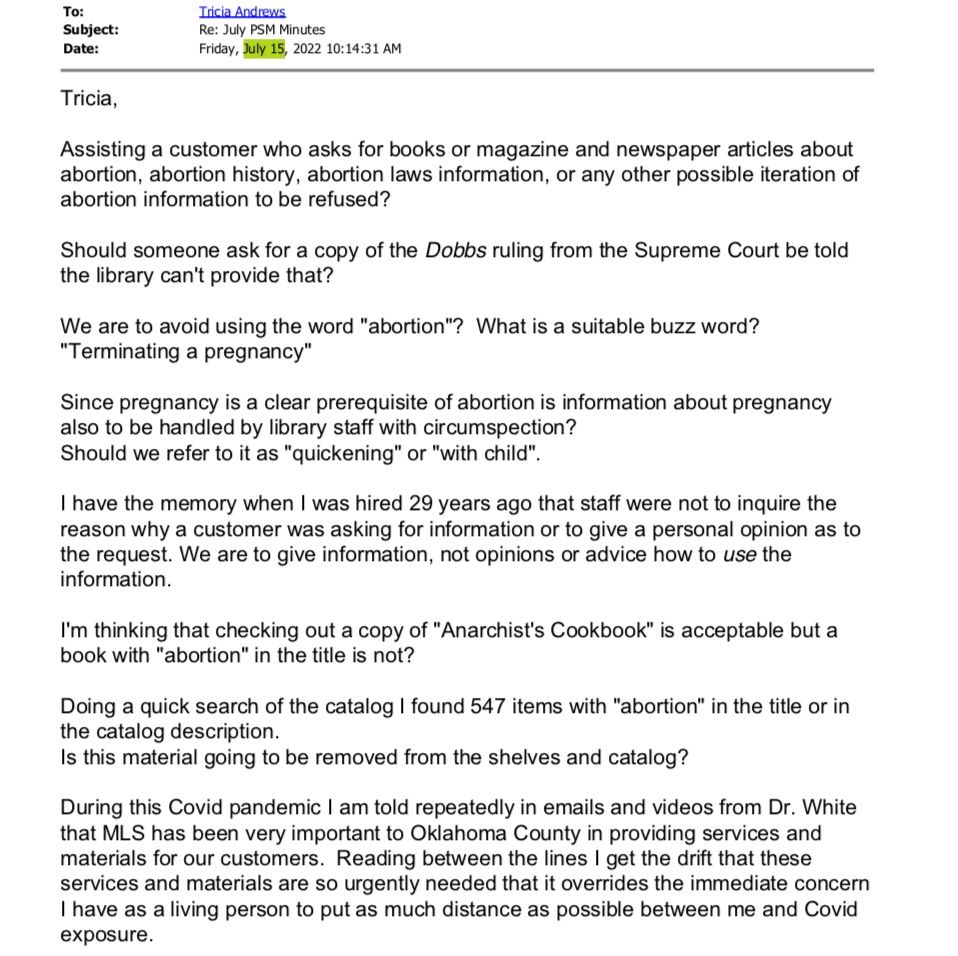
In the meantime, emails between Schuster and Spindle continued, discussing what would and would not be appropriate for staff to answer.
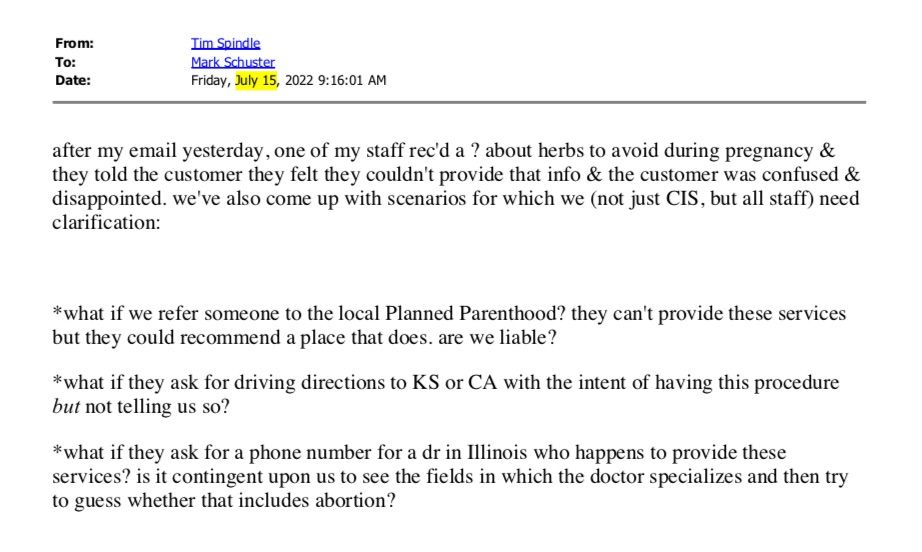
Much of their discussion focused on what could and could not be done by library workers, and while those emails bounced back and forth, so, too, did emails from other managers concerned about what they and their staff were hearing. Schuster developed a draft email to all senior managers to keep them abreast, and which would (eventually) be shared with all staff.
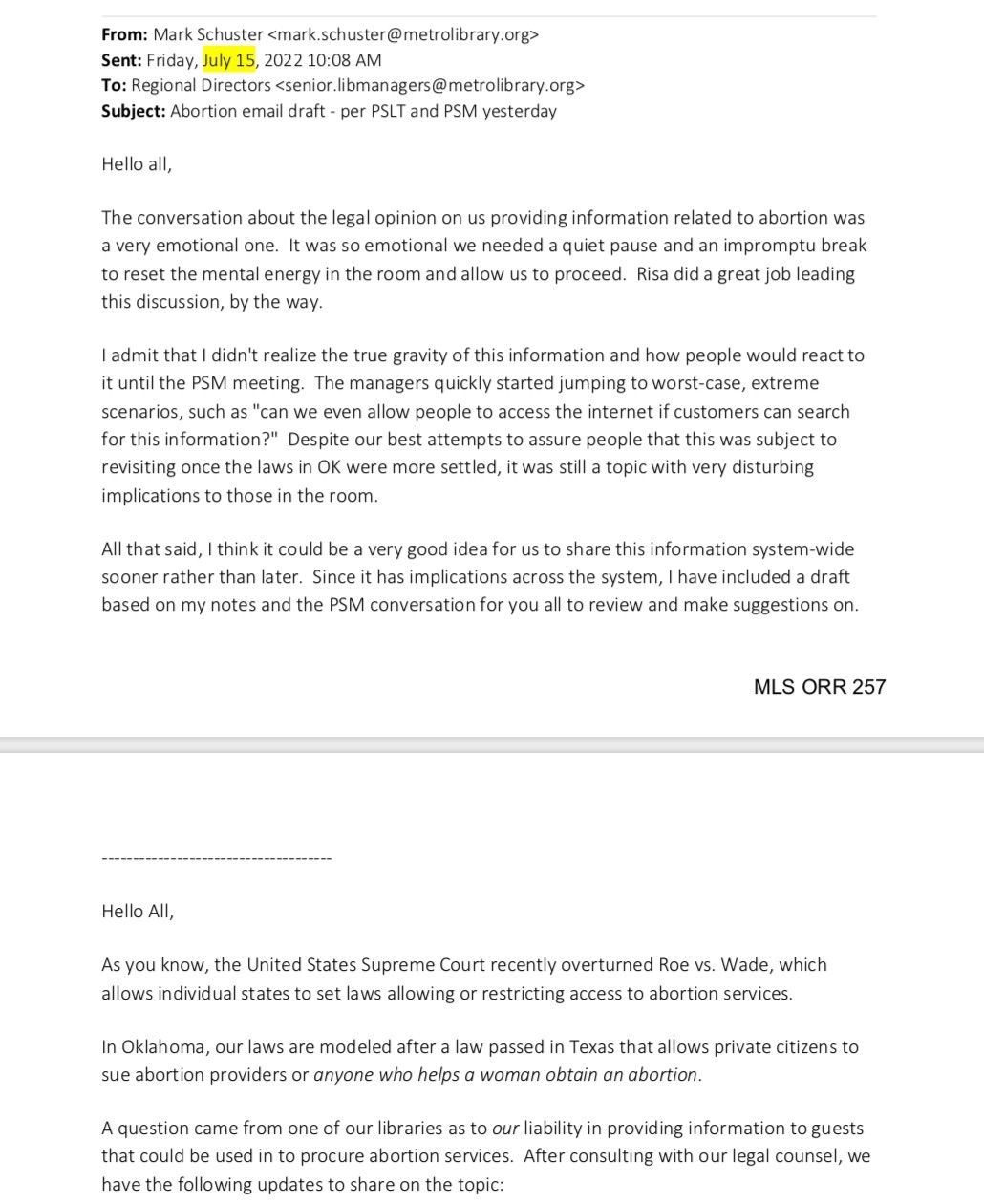
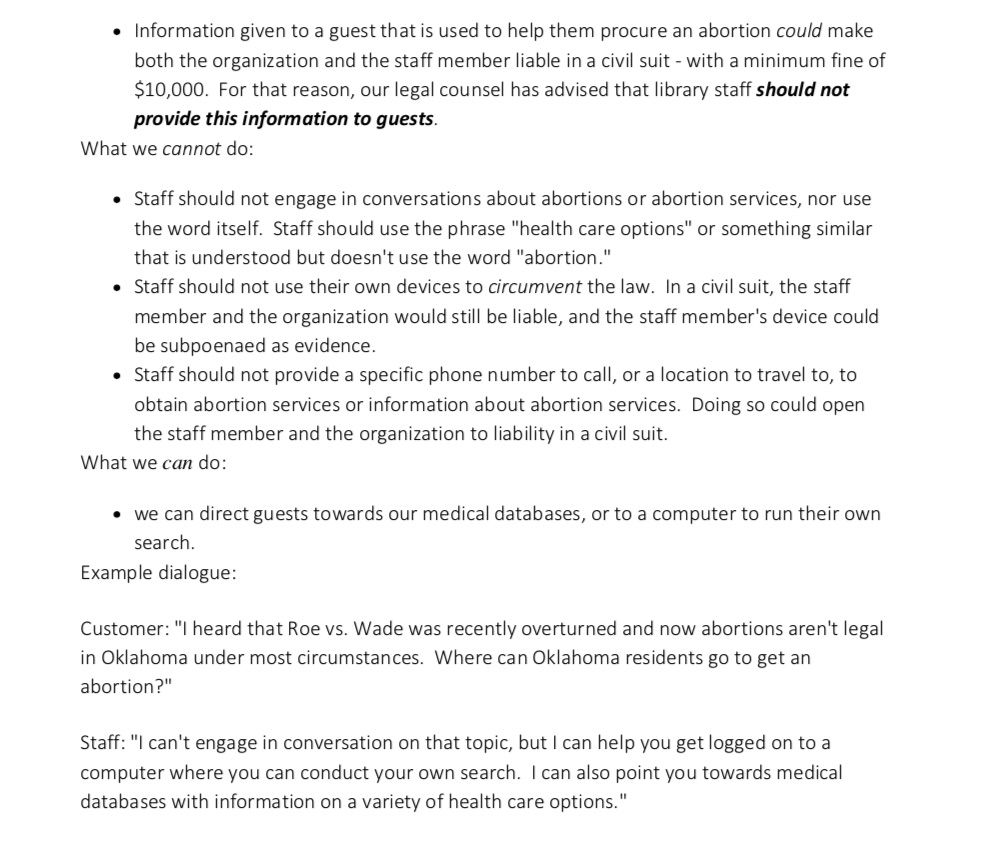
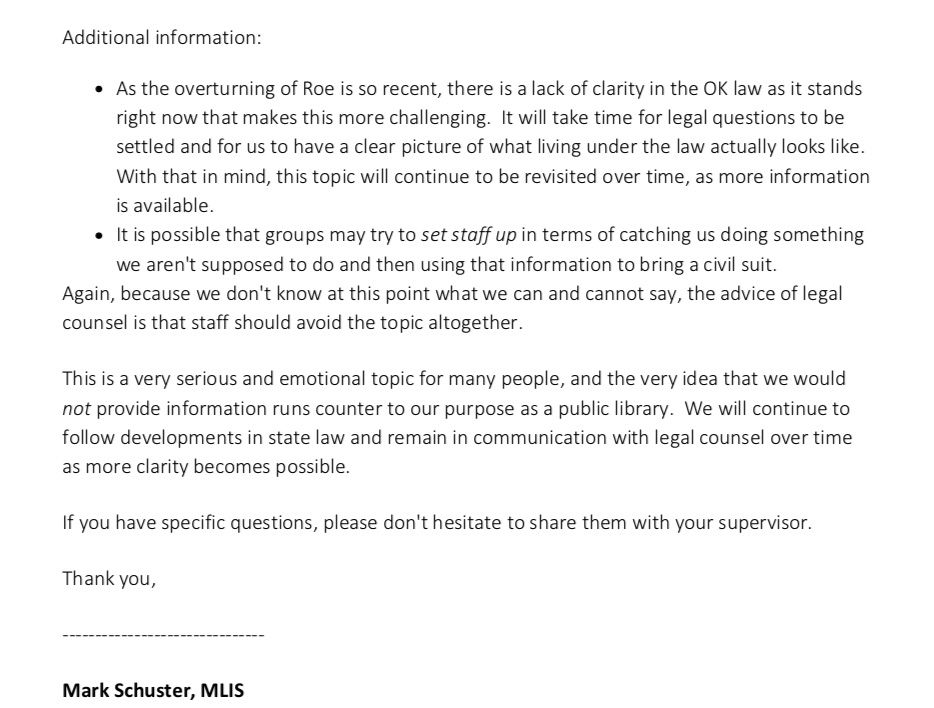
What’s interesting is how quickly Schuster pushes the gravity of this situation aside, suggesting that “extreme conclusions” came swiftly. It seems like he’s annoyed there may be a million upcoming questions. Remember at this point, no one but a few managers knows what is happening. Moreover, staff are already talking amongst themselves about how they’re being left in the dark.
Still, the library’s messaging to senior managers was not using the word abortion.
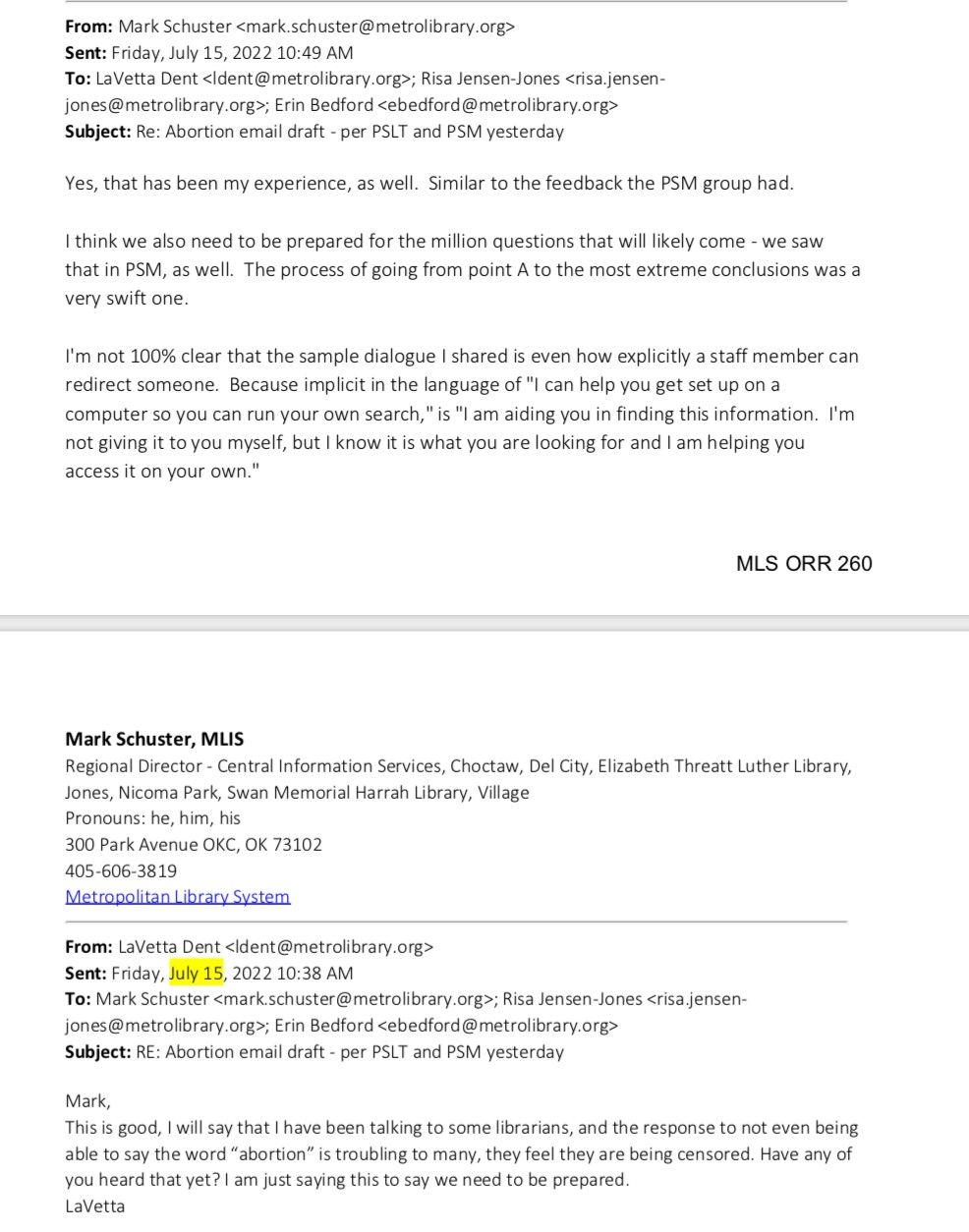
Several managers worked through how they planned to talk with their staff about the decisions, which led to even more questions about what would–and would not–be allowed.
One manager gave her staff a brief overview and ended the email with a note that the library’s employee assistance program offers counseling services.
“Please don’t struggle with emotions this may be bringing up alone,” she added. In an email to another manager, she expressed that she hated sharing that information was put on them to share with staff and did not come from higher-level management. There was not a single, standard communication across the system, and further, lower level managers were put in charge of telling their staff what they could and could not do.
I am hearing from people who are getting wind of this and people are upset. I hope that the message coming out shows some real compassion because there are going to be some terrified, angry, and incensed staff. I also wonder what message Pioneer and Tulsa are sending to their staff and if that was considered at all. This has the potential to rip us apart. I hope that supervisors are ready to weather this storm. — Email from a Metro maanager
To concerns raised during this time frame by managers, Schuster recommended “Empathy, active listening, candor, “rumbling with vulnerability” – all are useful tactics here.” But more, he emphasized that it’s time to consider what falling on the sword could mean for the library–especially in a generally conservative community.
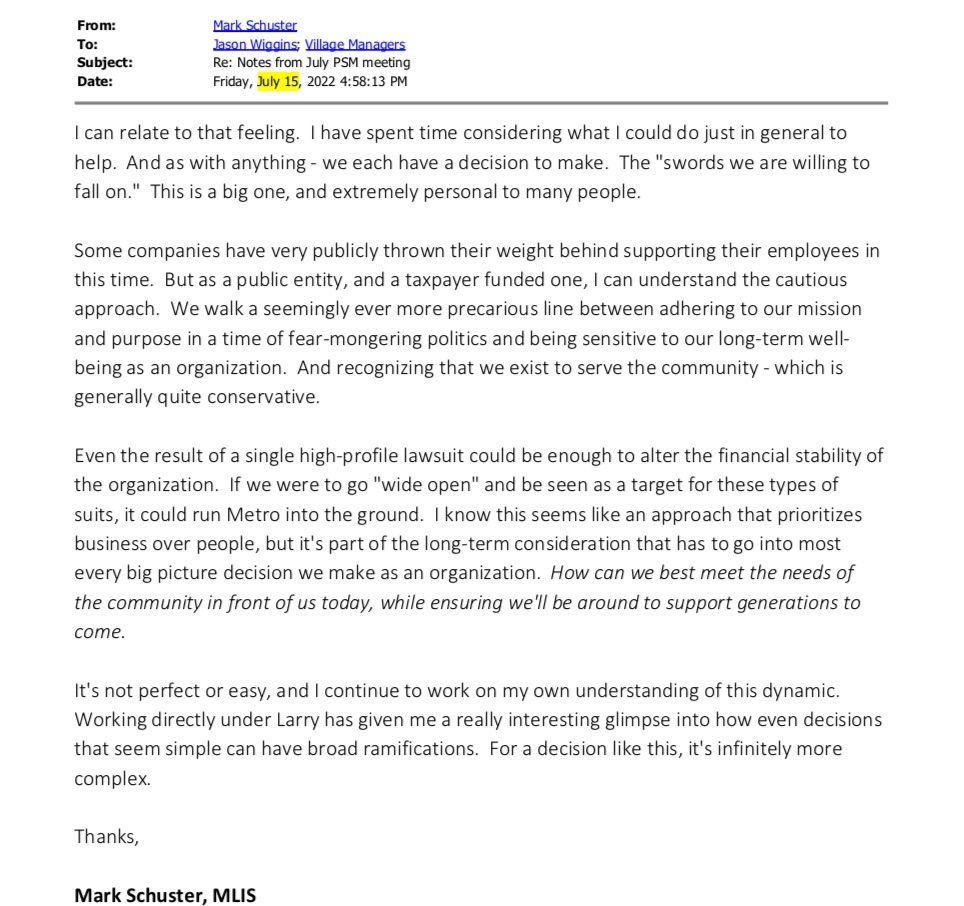
At the close of business on Friday, no single email had been sent to all staff, but conversation online was full throttle. The Reddit post picked up traction across social media, including Twitter and Facebook.
“I have not spoken to a single coworker who isn’t in disbelief. I was asked if I seen this coming and the answer is no,” said one librarian working within the system. “I’ve been involved with libraries my entire life and they’ve always somehow managed to find ways to avoid religious, cultural, and political glares and I had no reason to believe this would be different. There are more than a few library staff that say they’ll risk their job with Metropolitan before they risk their duty as information providers.”
Beyond the lack of communication about what was to come, library workers were well versed in Metro’s history.
In 2016, I wrote about Metro Library System’s practice of separating out LGBTQ+ children’s books from the collection. The decision came in the mid-00s, following complaints from some members of the community. The Library Board, some of whom thought the books should be removed all together, opted for this compromise. Those books have since been intershelved, but the memories of the library’s decision making linger.
That decision was made at the Library Board level. But now with abortion, the discussion did not reach that level but instead remained within the managers of the library. In many ways, that offered more freedom and flexibility to act–and indeed, it is clear management moved on this as they did in order to prevent potential harm to themselves and library staff–but in other ways, it opened up exactly this: a communication breakdown.
“Initially, I was upset with those telling us not to do a core function of our job (reference work),” explained a librarian in the system. “But with some thought it really is about protecting the library’s most important asset – its staff.”
They added, “[Management is] frightened and I don’t blame them for listening to legal advice, but I do firmly believe the better route would have been to contact organizations like with ALA, have their lawyers study up on the library’s purpose in communities, and prepare a case for the first onslaught of “potential” civilian lawsuits. This isn’t a fight we need to hide from and remain under the radar on. It’s the library’s time to do what we’re best at – defend liberties with researched defenses.”
Larry Nash White, the Executive Director of the library system, told his regional directors on Monday morning to hold off on communication until after their meeting later that day. The plan was to figure out how to communicate what staff could and could not say through the public service managers. Later that day, Schuster sent a draft of the updated information to regional directors.
The information in this email was intended to be shared verbally with senior managers and staff. It emphasizes that information given to a guest that could facilitate them deciding to get an abortion could be a legal issue.
“Could” is the operative word here. It is the ethical duty of librarians to provide information to those who seek it, and anything relating to abortion–where there might be a facility outside Oklahoma providing the services, what the procedure costs, phone numbers for those who may help individuals secure funds to get an abortion–is well within the scope of duty. Indeed, not providing that information would cause more harm and distrust in the library than giving it freely. A library worker looking up and giving that information is not the same as a library worker on the clock offering to take the patron across state lines to get the procedure.
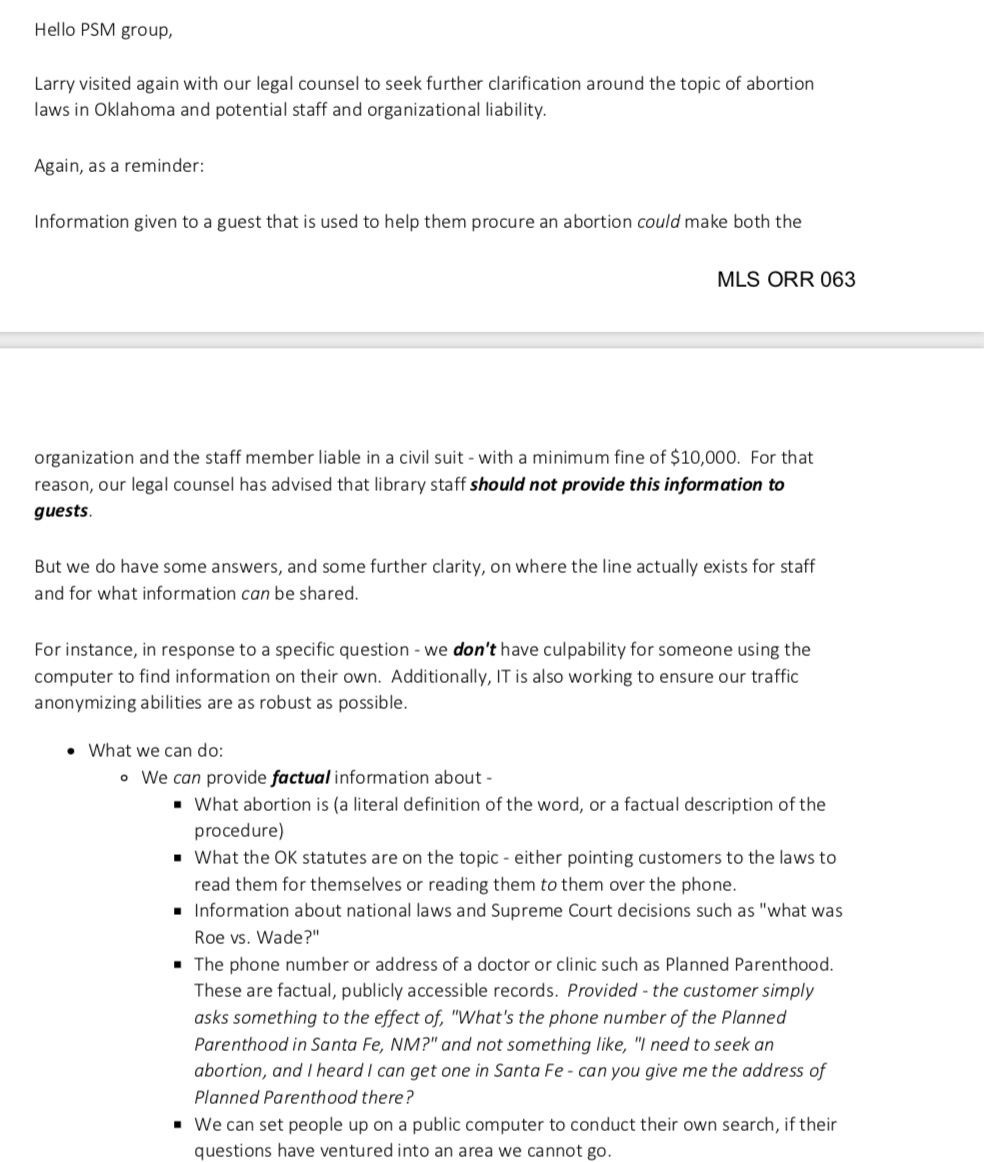
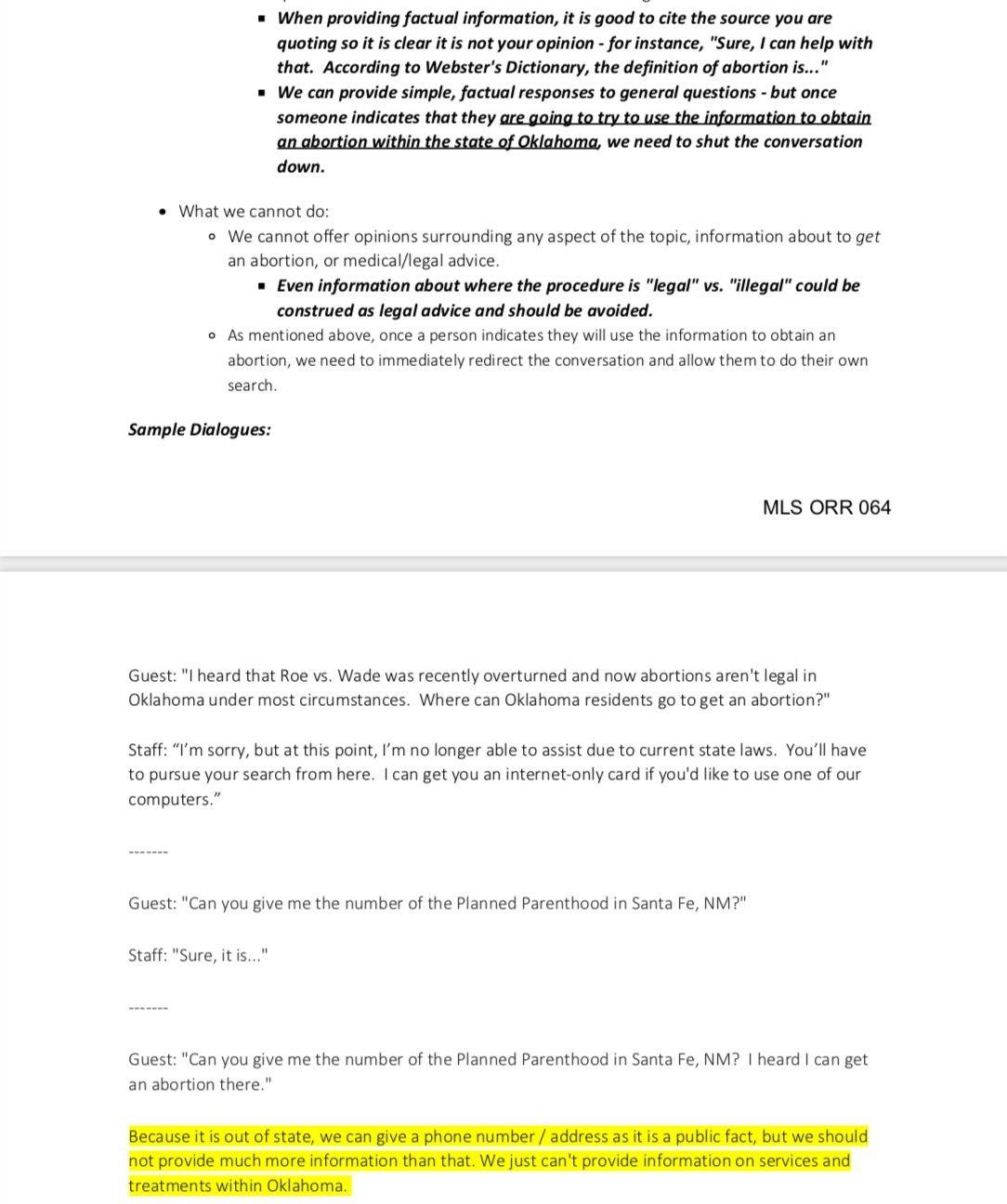
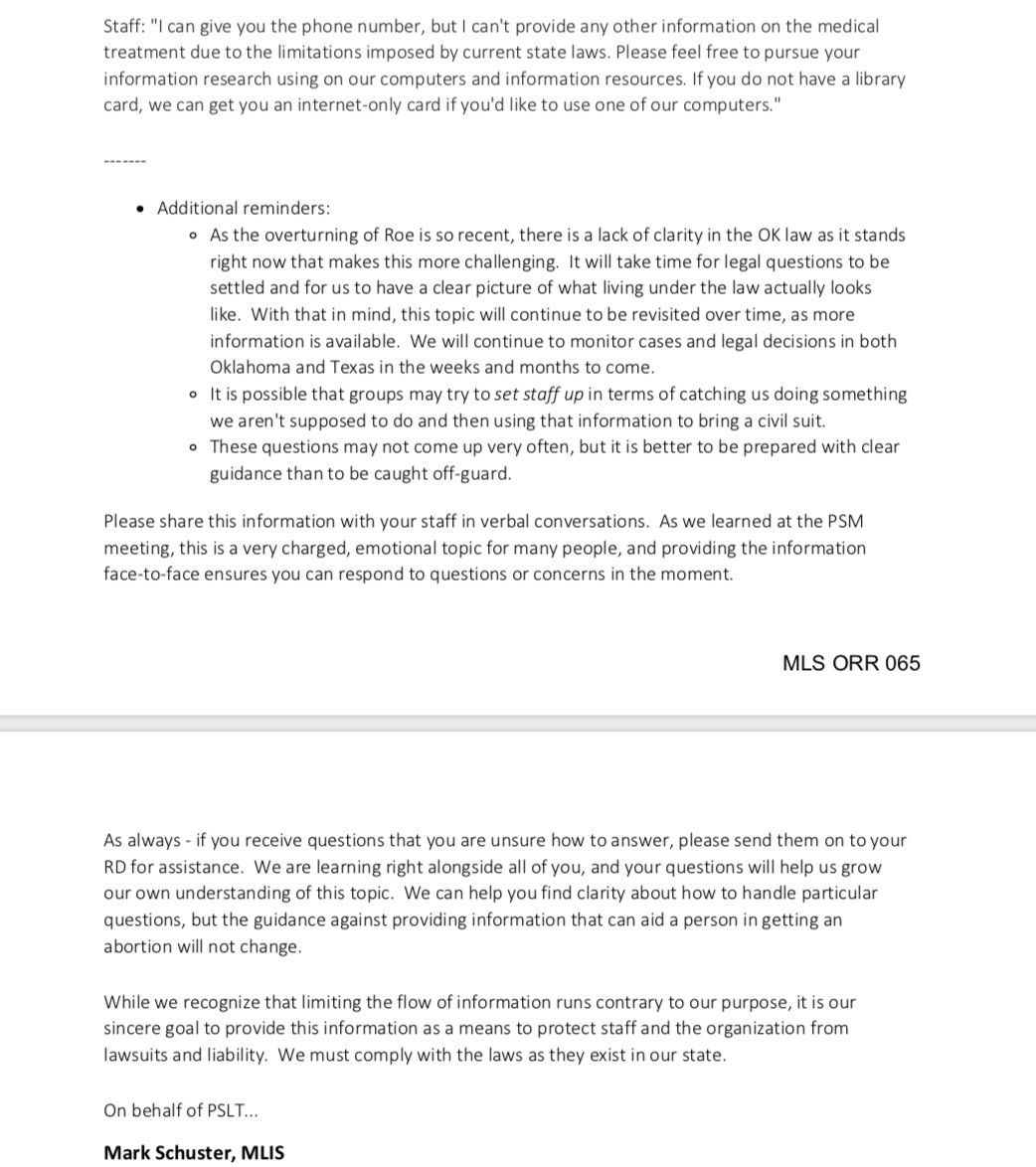
Managers disseminated the message, and it was not long before staff members asked for further clarification. If it’s not in writing, how can they know what they can and cannot say?
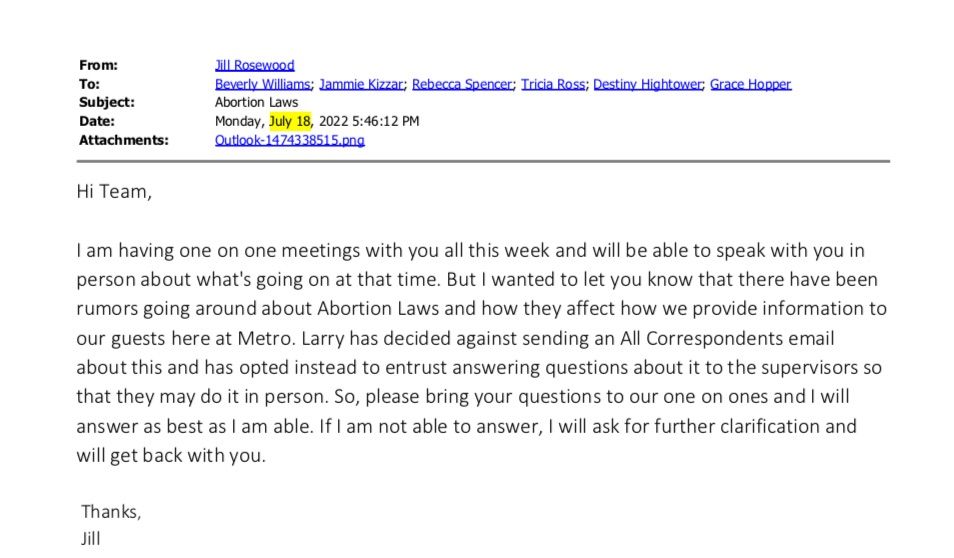

The evening of July 18th, I tracked down the information for where to submit a Freedom of Information Act (FOIA) request for the library after being contacted by several individuals and being sent the Reddit post. The information for FOIA was impossible to track down and because while the library operates both on the city and county level, it is under the direct jurisdiction of neither–I could not go to the city nor the county. This FOIA would be to the library directly.
As of Monday, the post was still active on Reddit. Information continued to circulate regarding what staff could or could not say and whether or not use of the word “abortion” was allowed.
Early on Tuesday, July 19, 2022, I submitted the following open records request: “Emails to and from the following Metropolitan Library administration and commission (emails ending in @metrolibrary.org) with the word “abortion” between the dates of June 15, 2022 and July 19, 2022 [names were listed]. Additionally: ALL emails to/from those with an @metrolibrary.org address with the word “abortion” from July 1-July 19, 2022.”
Just over an hour later, the library’s Executive Director contacted the lawyer for the library asking if it even needed to be addressed.
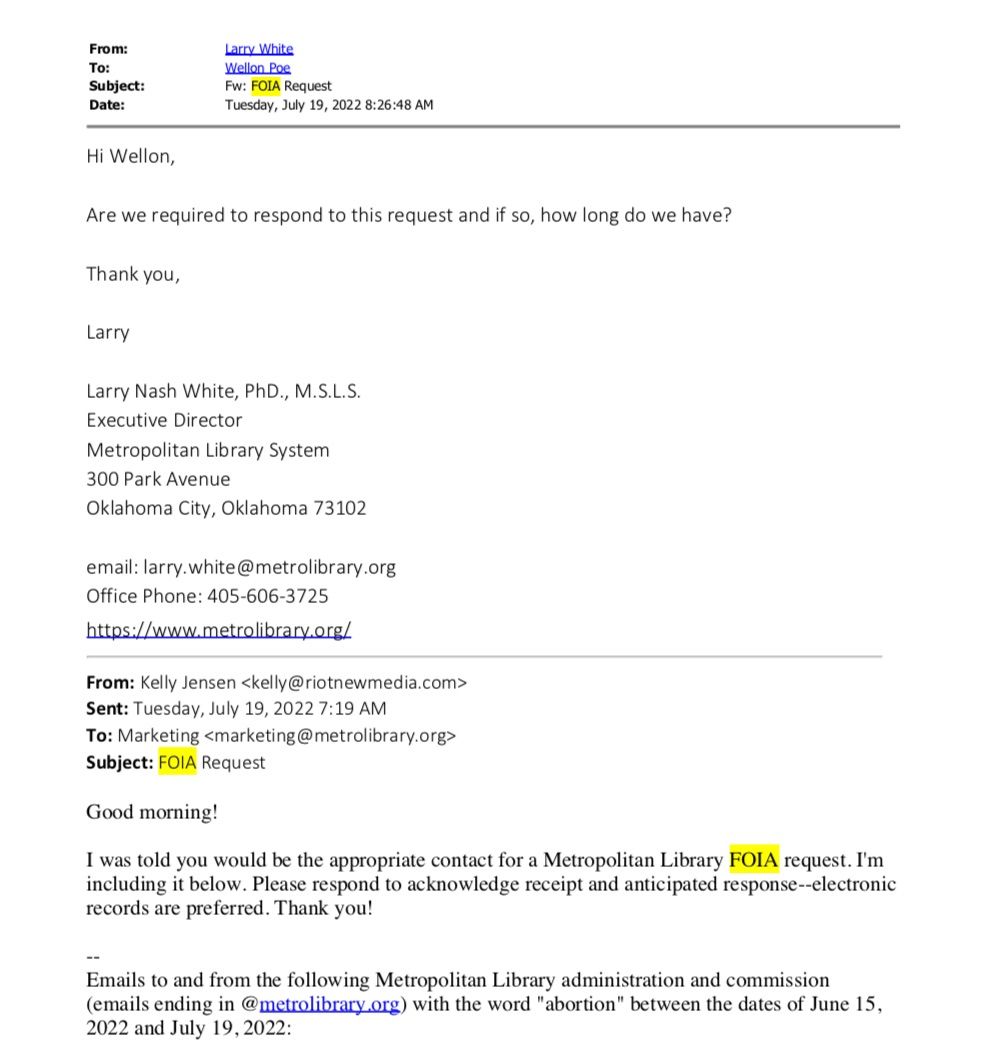
It is the legal right of any citizen to submit a FOIA request to any tax-funded institution. In Oklahoma, there is reasonable time given for response, but response is required. Aside from White asking the lawyer if responding was required, he informed several others involved with the request to not respond to it.
In addition to asking about whether or not my request needed a response, it was clear that managers were directed to take all discussion of abortion–including the new guidelines for staff–off email.
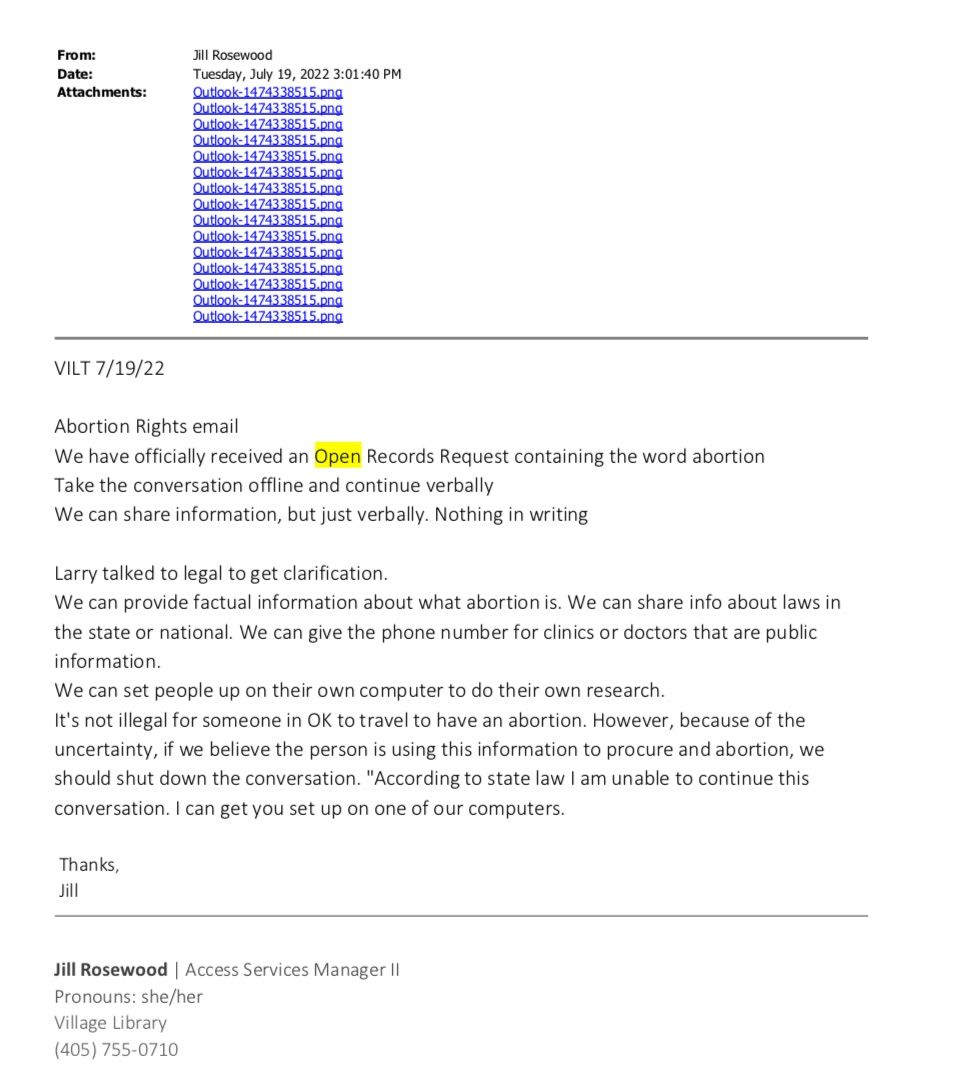
At this point, there had yet to be a staff-wide email advising what was–and was not–appropriate to say or provide information on related to abortion. The final draft of Schuster’s email was approved by White later in the day, but the trail drops off after, presumably because of advice to stop talking about anything related to abortion via email.
If it’s said out loud and there’s no paper trail, then it can’t be requested via FOIA.
I waited over 48 hours and heard nothing back, so I followed up asking if the request was being addressed. White responded moments later that it was.
Every time I think the library system tops itself, I get another email. I saw this on social media today and was hoping it was just a rumor.
Avoiding speaking about the topic entirely is not something a library should ever even put out there to begin with. That’s the most ridiculous thing I’ve ever heard. We provide information and resources to the community.
Women have JUST lost our bodily autonomy a few weeks ago. Lost the right to safe access. And now we (or they) aren’t supposed to talk about it. And now the branch workers cant help women gain access to resources???
I’m devasted, disappointed, and I think this goes against everything we stand for as an institution.
At Almonte we saw a child who was assaulted at home and came in with no other place to turn. And we helped them find resources. Can you imagine if we just had thrown a book at her and told her to look up abortion and that’s all we can do? I’m so grossed out and disappointed right now. The library is supposed to be a safe place with access to any information and resources we have.
WE ALWAYS GAVE OUT COMMUNITY RESOURCES. And most librarians will probably continue to discreetly do it anyway because they know these puritanical, antiquated ideas only HARM the patrons. WE ALL KNOW THIS IS TRUE WHETHER YOU ARE FOR OR AGAINST CERTAIN TOPICS.
I DID NOT THINK THE LIBRARY would become another tool of oppression from the local government’s political agenda.
First it’s LGBTQ+ displays, now it’s the suppression of possible life saving information. Where does it end???
And my for my only non-rhetorical question is this whole email. I’d like to ask what is Larry doing about it?
Sincerely,
Furious, underpaid employee contemplating their entire existence*
The above email was sent by an employee to several individuals within management at the library system on Wednesday, July 20. It took until then to address the rumors circulating online about the library where staff were told not to say the word “abortion,” and a day before Vice scooped the story.
Several individuals began emailing about the Reddit post, now five days after its initial appearance. By that point, the post had made the rounds on Library Twitter and Facebook, and even those not digging into the story had a suspicion as to which library this was. Certainly, those working for the system did.
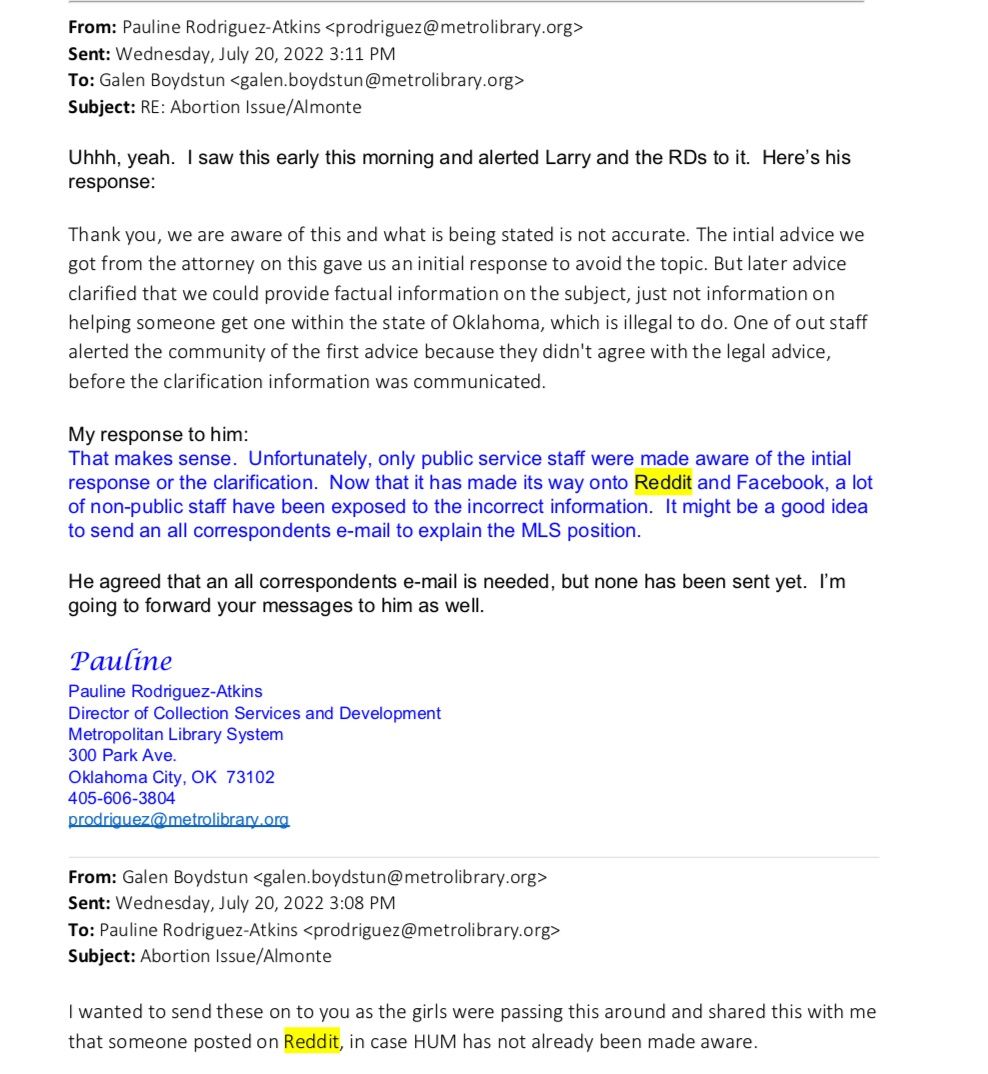
As of the late afternoon of July 20, no all-staff email had gone out, and managers–directed to talk verbally with staff and not via email–had no paper trail showing what did or did not get shared.
Most interesting, though, is the comment that what was being stated in the Reddit post was incorrect. It was and it is. The entire trail of emails, beginning with the meeting minutes through the following week repeatedly stated use of the word “abortion” was discouraged and that doing more than providing tools (i.e., showing someone where the public computers are) would not be appropriate. That answering a query about the phone number to a New Mexico Planned Parenthood that does abortions–words of the patron–would not be acceptable.
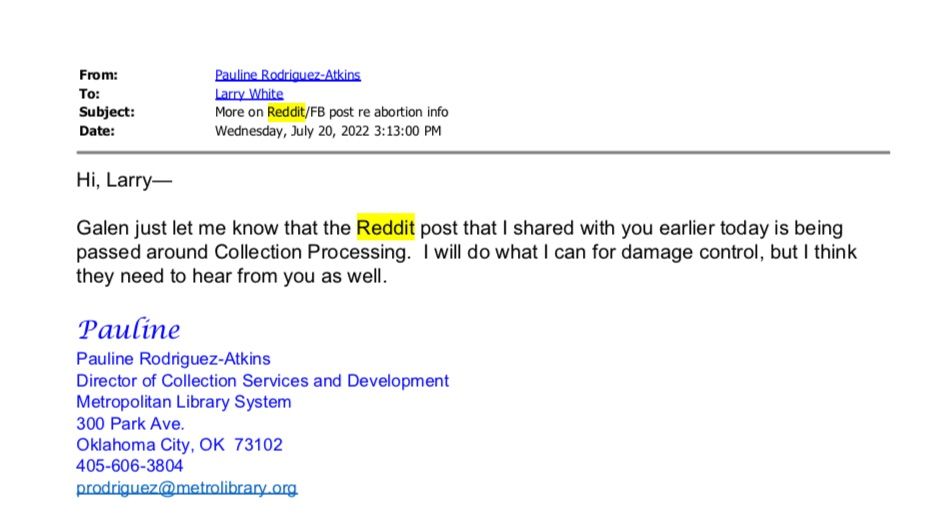
I did not receive my requested FOIA materials until August 8, sent to me via Dropbox. There were hundreds of pages, most of which are condensed above in screen shots.
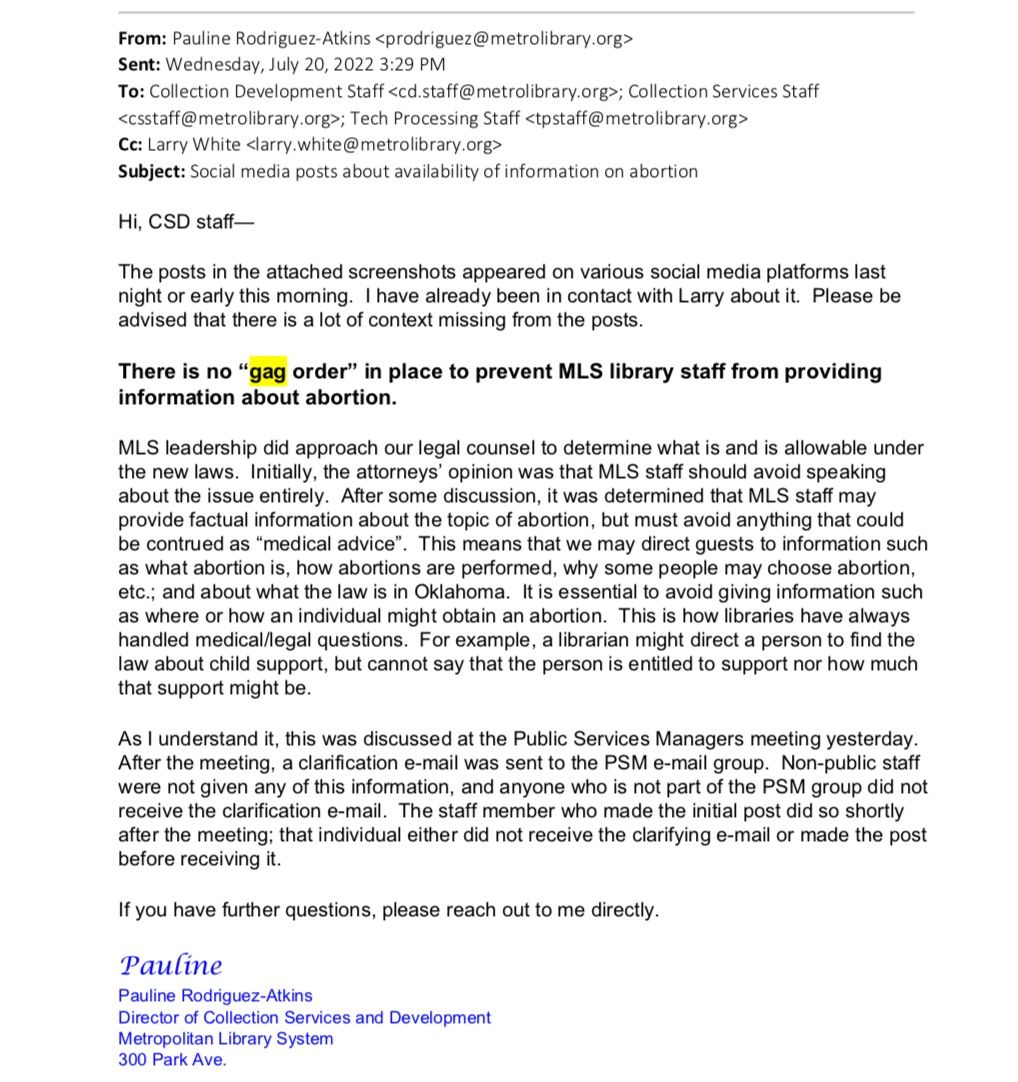
This material came after Vice’s piece and after METRO responded via their social media about the rumors regarding a staff gag order on “abortion.”
The Metro Library System’s mission is “Connecting our diverse communities with resources and experiences to educate and enrich lives.” And yet, this mandate from upper management flies in the face of not only their mission, but the purpose of a public library. As seen through the week and a half of emails and meeting notes, some members of management were choosing to undermine their work and reputation–and worse, they chose not to tell staff about it in a reasonable frame of time, leading to staff members worrying about where and how they may need to put their necks on the line to serve their community.
This behavior breeds distrust between staff and management, and further, creates a deep distrust between staff and patrons. At the end of the day, it’s not top management that will be yelled at by patrons or who have to provide information to patrons without actually providing information–showing them how to log on to a computer is not giving them the phone number to a clinic they asked for and neither is using “health care options” in place of the word “abortion”–it’s those on the front line. No all-staff email from the library’s Executive Director, who had been in communication with the library’s lawyer, ever emerged. Even those reporting directly to the Executive Director did not send an all-staff email. Instead, the information was telephoned through lower management, who had to develop their own way of not only conveying what could and could not be said to patrons about abortion but who then had to push questions back up the chain and wait for a response.
Despite the claim there is no gag order, there is. It’s right there in the emails that staff are to avoid using the word “abortion.” That it is a trigger word for what can and cannot be done in service of the community.
There are plenty of staff and folks outside the system who see all of this as a way to protect library workers, and ultimately, it is. Upper management worked hard to answer great questions from those working at Metro, but they did so in a sloppy manner and did so in a way where they could remove themselves from responsibility of outcome. There was no standard set of answers, and more questions did not get addressed than did (at least so far).
But it is deeply disturbing that someone working at the top of a major library system, one which has been in the spotlight before for handling LGBTQ+ books in the children’s section in a problematic manner, wanted to undermine the democratic right of a person to put in a FOIA request in order to help out those working in the system who were desperate for answers.
Abortion is healthcare. Citizens deserve accurate, timely information when they inquire about any topic at their public library, conservative community or not. Expecting front line library workers to not do their job and not giving them a clear reason as to why they can’t undermines their professionalism. It does not ensure them safety nor the right to do good work. It instead creates distrust and anger.
If your library staff can’t do their jobs, then why would citizens want to support and champion their public library, one of the biggest gems of our democracy? The erosion of trust will only continue to breed mis- and dis- information.
The damage is already done.
*All of these quotes were acquired through a Freedom of Information Request to Metro libraries.






